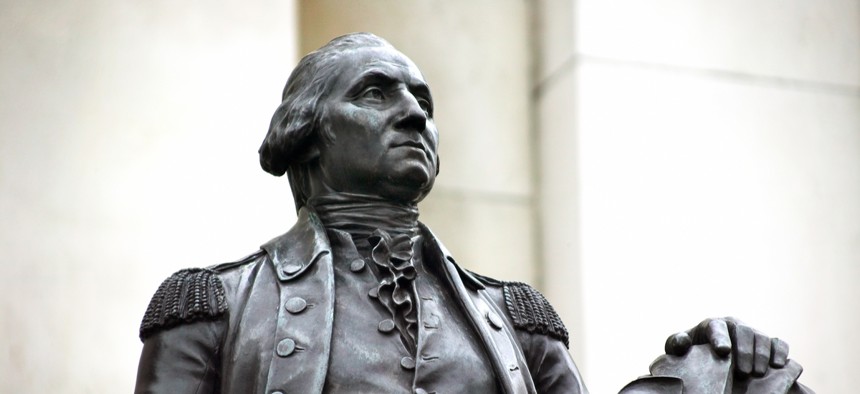The bigger question among Washington scholars when it comes to the founder’s sexuality in recent years has been whether or not he was sterile. Given that the historical consensus is now that he was likely unable to have children, most historians do not believe that Washington fathered any children. He certainly didn’t have any children with Martha, but if he had sexual relationships with other women (including enslaved women, as was common among his contemporaries), historians have yet to find firm evidence. It is certainly possible; as historians learned in the case of Thomas Jefferson, knowing the character of individuals is insufficient to understand their sex lives.

Tony Baggett / Shutterstock.com
Did George Washington ‘Have a Couple of Things in His Past’?
A historian assesses Donald Trump’s claim that the first president faced his own allegations of sexual assault.
It’s not every day that George Washington trends on Twitter. Normally, historians would rejoice at this, but the reason the first president was in the news was due to a curious, ungrounded claim by the current president. In defending his Supreme Court nominee, Brett Kavanaugh, against multiple accusations of sexual assault during a press conference Wednesday, President Trump maintained that the Democrats would have voted against confirming George Washington. After all, “he may have had a bad past, who knows, you know? He may have had some—I think accusations made. Didn’t he have a couple of things in his past?”
Actually, we know quite a lot about Washington’s past with women. There is evidence that the normally reserved figure could be flirtatious, that he fell passionately in love with a married woman before his own marriage to Martha Custis, and that he had several close female friends. But while we can never gain a complete picture of the sex life of somebody who lived over 200 years ago, there are no contemporary accounts that even hint at sexual assault.
Washington met his first great love when he was 16. She was the recently-married, 18-year-old Sarah Cary Fairfax. Sally, as she was known, was married to a wealthy Virginia landowner whose sister, in turn, was married to Washington’s elder brother Lawrence. George and Sally socialized and performed plays together, building a flirtatious friendship. In the winter of 1758, Sally nursed the seriously ill young Washington back to health at Mount Vernon. Her husband was abroad, and it is possible that there was physical intimacy involved—but there is no way to know. Washington relied on Sally’s husband for patronage and guidance, so the young man on the make would surely have tread carefully.
Soon after Washington recovered, he met the wealthy widow Martha Dandridge Custis. It is unclear when they became engaged, but by September 1758 he was expecting to marry her. He wrote Sally a remarkable letter that month which she saved the rest of her life (and which made national news when it resurfaced at auction in 1877). “Tis true, I profess myself a Votary to Love,” he told her, “and further I confess, that this Lady is known to you.—Yes Madam, as well as she is to one, who is too sensible of her Charms to deny the Power, whose Influence he feels and must ever Submit to.” However, he knew “how Impossible this is.” He admitted that his declaration of love was “an honest confession of a Simple Fact” but she should not share it, as “the World has no business to know the object of my Love.”
Sally professed not to understand who “this Lady” was and soon after, Washington married Martha Custis. George brought Martha into his friendship with Sally and her husband, and the two couples remained friends. While he may not have been in love with Martha when they married, he soon moved past his infatuation with Sally and became a loving and devoted husband. In one of only two surviving letters from George to Martha, he declared his “unalterable affection for you, which neither time or distance can change” and signed himself “Your entire, Go: Washington.”
While George Washington’s heart was entirely Martha’s, he had nonromantic but nonetheless affectionate friendships with several women. This was in fact the norm for the period; most elite men had female friends. He befriended two women while he was in Philadelphia in the 1780s, Annis Boudinot Stockton and Elizabeth Willing Powel. Stockton, a widow who held dinners for Revolutionary War officers at her home in Princeton, wrote poetry praising the heroic General Washington. Rather than being dismissive of, or embarrassed by, her tributes, he wrote playful letters to her.
It was Stockton’s friend Elizabeth Powel, however, who became one of George’s closest friends. Powel and her husband Samuel were prominent Philadelphia residents, and their home became a refuge for Washington during the Continental Congress and Constitutional Convention. They discussed both family life and politics, and here again Washington’s writing could be light and lively. In one of his last letters to her, he subscribed himself “With the greatest respect & Affecte. I am always Yours.” This was not a romantic declaration; friends could express their emotion more fulsomely in the language of the late 18th century. Martha shared in this friendship with Powel, and it was fully in keeping with the customs of the period.
Refuting Trump’s bizarre reference to George Washington does not require painting the iconic founding father as a one-dimensional hero who never erred or felt deep emotion. Rather, it opens an opportunity to understand the caring and sometimes passionate relationships Washington shared with a select group of women.






